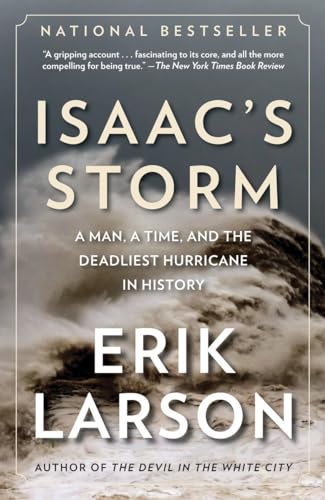From the bestselling author of The Devil in the White City, here is the true story of the deadliest hurricane in history. National Bestseller
September 8, 1900, began innocently in the seaside town of Galveston, Texas. Even Isaac Cline, resident meteorologist for the U.S. Weather Bureau failed to grasp the true meaning of the strange deep-sea swells and peculiar winds that greeted the city that morning. Mere hours later, Galveston found itself submerged in a monster hurricane that completely destroyed the town and killed over six thousand people in what remains the greatest natural disaster in American history--and Isaac Cline found himself the victim of a devastating personal tragedy.
Using Cline's own telegrams, letters, and reports, the testimony of scores of survivors, and our latest understanding of the science of hurricanes, Erik Larson builds a chronicle of one man's heroic struggle and fatal miscalculation in the face of a storm of unimaginable magnitude. Riveting, powerful, and unbearably suspenseful,
Isaac's Storm is the story of what can happen when human arrogance meets the great uncontrollable force of nature.
On September 8, 1900, a massive hurricane slammed into Galveston, Texas. A tidal surge of some four feet in as many seconds inundated the city, while the wind destroyed thousands of buildings. When the water and winds subsided, entire streets had disappeared and as many as 10,000 were dead--making this the worst natural disaster in America's history.
In Isaac's Storm, Erik Larson blends science and history to tell the story of Galveston, its people and the hurricane that devastated them. Drawing from hundreds of personal reminiscences of the storm, Larson follows individuals through the fateful day and the storm's aftermath. There's Louisa Rollfing, who begged her husband August not to go into town the morning of the storm; the Ursuline Sisters at St. Mary's orphanage who tied their charges to lengths of clothesline to keep them together; Judson Palmer, who huddled in his bathroom with his family and neighbours, hoping to ride out the storm. At the centre of it all was Isaac Cline, employee of the nascent Weather Bureau, and his younger brother--and rival weatherman--Joseph. Larson does an excellent job of piecing together Isaac's life and reveals that Isaac was not the quick-thinking hero he claimed to be after the storm ended. The storm itself, however, is the book's true protagonist--and Larson describes its nuances in horrific detail.
At times the prose is a touch too purple, but Larson is engaging and keeps the book's tempo rising in pace with the wind and waves. Overall, Isaac's Storm recaptures at a time when, standing in the first year of the century, Americans felt like they ruled the world--and that even the weather was no real threat to their supremacy. Nature proved them wrong. --Sunny Delaney
![]()
